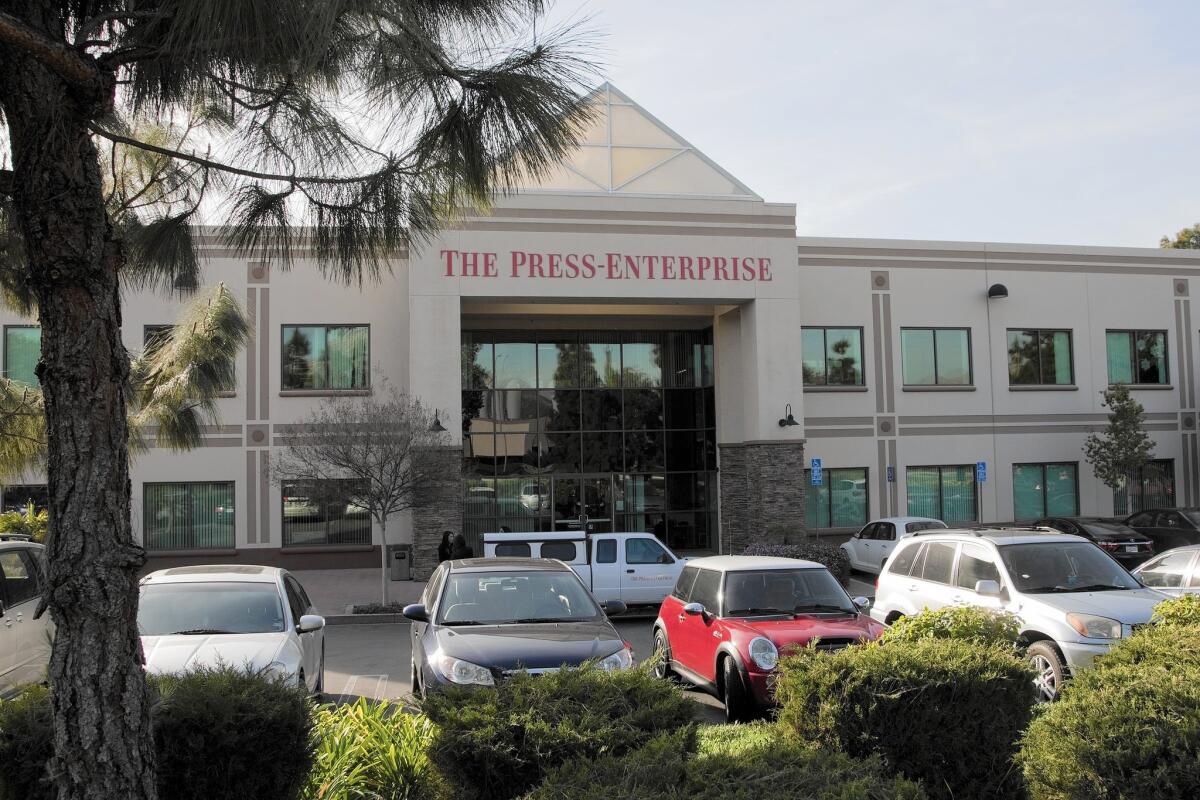What’s next for Orange County Register buyer Digital First?

After Freedom Communications filed for bankruptcy last year, the question was who would buy its newspapers, the Orange County Register and Riverside Press-Enterprise. Now that they have been sold to Digital First Media, another question looms: Who will buy Digital First?
The Denver publishing company, which also owns the Los Angeles Daily News, eight other local dailies and dozens of papers in other regions, is owned by a New York hedge fund, Alden Global Capital, that tried to sell Digital First in 2014 — and will almost certainly do so again.
“They’ll look for the exits as fast as possible,” said Lloyd Greif, chief executive of downtown L.A. investment bank Greif & Co. “They’re not long-term holders.”
Alden has had a stake in Digital First, through predecessor company MediaNews Group, for more than five years, but typically holds its investments for less than a year, according to data provider Factset.
The hedge fund bought in to the company when it was a major investor in newspaper chains, holding stakes in the privately held owner of the Philadelphia Inquirer and Daily News and several publicly traded publishing companies, including the owners of the Sacramento Bee, the Dallas Morning News and USA Today.
But that was in 2010 and 2011. By the end of 2012, Alden had sold its newspaper stocks and the Philadelphia papers. Alden later tried to sell Digital First too, but a deal with private equity firm Apollo Global Management fell through.
Now that Digital First has acquired the Register and Press-Enterprise, Greif said he expects the company to integrate those papers into its other operations and cut costs where it can. Then he expects Alden to once again look for a buyer for Digital First.
“They’re looking to flip it, no question,” he said.
Digital First has already flipped some of Freedom’s most valuable assets: real estate. The company sold 14 acres of former Freedom land in Santa Ana, including the site of the Register’s printing press, to developer Mike Harrah, with plans to lease at least some of it back.
Ron Hasse, president of Digital First’s Southern California News Group, confirmed that Harrah bought the Santa Ana property but said he could not confirm a price. Harrah did not return calls for comment. The Orange County Business Journal reported that the deal was valued at $34 million.
Twenty Lake Holdings, a New York firm with offices in the same building as Alden Global, also acquired a 6-acre site in Riverside that is home to the Press-Enterprise’s printing press. Twenty Lake owns a dozen office and printing properties used by Digital First-owned papers.
Digital First paid $49.8 million for Freedom’s assets, meaning that after selling off the real estate, it paid less than $16 million for the two papers, not including any proceeds from the Riverside deal. That might sound like a bargain, but the two papers combined are not profitable, reporting losses of $4.5 million from November through February, according to Bankruptcy Court filings.
The challenge for Digital First, which executives say is profitable, will be to cut costs, increase revenue or both to bring Freedom’s papers into the black.
Hasse would not comment on the company’s strategy, but costs already have been cut. After the sale, but before Digital First took over the Register and Press-Enterprise on April 1, former owner Freedom Communications laid off about 70 employees across operations, newsroom sources said.
And while those cuts included Chief Executive Richard Mirman and Register Editor Rob Curley, the hit to the Register newsroom has so far been small — fewer than 10 reporters and editors, the sources said.
High-level executive cuts are common way to save money after an acquisition. Media industry analyst Ken Doctor said more newsroom cuts could be on the way.
Digital First’s nine other papers already share copy editors, designers and content. For instance, the papers share coverage of the Angels and Dodgers rather than having reporters from each paper assigned to the teams.
The Register and Press-Enterprise also share stories. The next step could be for Digital First to further consolidate by running stories from its other newspapers in the two new acquisitions, potentially meaning the chain would need fewer reporters.
“They’ve got to decide if the readers of the Register and the Press-Enterprise are going to be served by the people who serve the L.A. readers,” Doctor said. “How many Dodgers, Lakers and Clippers writers are they going to have?”
Another cost-saving measure Digital First might employ is reducing the number of titles it produces, a move the company recently made in Northern California.
Last week, Digital First stopped printing the Oakland Tribune, the Contra Costa Times, Hayward’s Daily Review and Fremont’s Argus as daily newspapers, instead rolling them into a single daily called the East Bay Times.
It also consolidated the San Mateo County Times and San Jose Mercury News into a single paper, the Mercury News.
Doctor said the move should help Digital First save on printing costs and could be duplicated in Southern California.
Though executives have offered no hint that such a move is in the offing, ever since the company announced the Bay Area consolidation, reporters at local Digital First papers have speculated about what titles could be cut or combined in Southern California.
One potential combination could be a roll-up of Digital First’s three San Bernardino County newspapers — the Sun, Inland Valley Daily Bulletin and Redlands Daily Facts — with the Press-Enterprise, creating a single Inland Empire-focused paper.
Whatever the outcome, the big question for Alden now is who might be an interested buyer.
Tribune Publishing was interested in acquiring the Register and Press-Enterprise, but the threat of antitrust litigation from the Justice Department derailed that plan. Doctor said Tribune could still be interested, but would likely have to go to court to address the government’s concerns.
Tribune executives declined to comment.
Other newspaper publishing companies, such as Gannett Co. and New Media Investment Group, have been acquiring more papers lately and could be interested in buying some of Digital First’s assets, Doctor said.
But he expects those companies would not be interested in Digital First’s marquee properties — the Denver Post or the newspaper groups in Southern California and the Bay Area. That might require Digital First to be sold in pieces.
Both Gannett and New Media, the latter managed by private equity firm Fortress Investment Group, have lately focused on buying papers in small and mid-sized cities where newspaper circulation and advertising revenue have declined less sharply.
Digital First has plenty of papers in such markets, with two dozen papers in small and mid-size towns from Massachusetts to Minnesota.
“The prevailing theory is that big metro areas perform less well than smaller metro areas,” Doctor said. “In those markets, there’s not a lot of broadcast competition. Advertisers need those papers. It’s easier to see how [New Media] papers in the East could combine with Digital First properties.”
Twitter: @jrkoren
More to Read
Inside the business of entertainment
The Wide Shot brings you news, analysis and insights on everything from streaming wars to production — and what it all means for the future.
You may occasionally receive promotional content from the Los Angeles Times.











